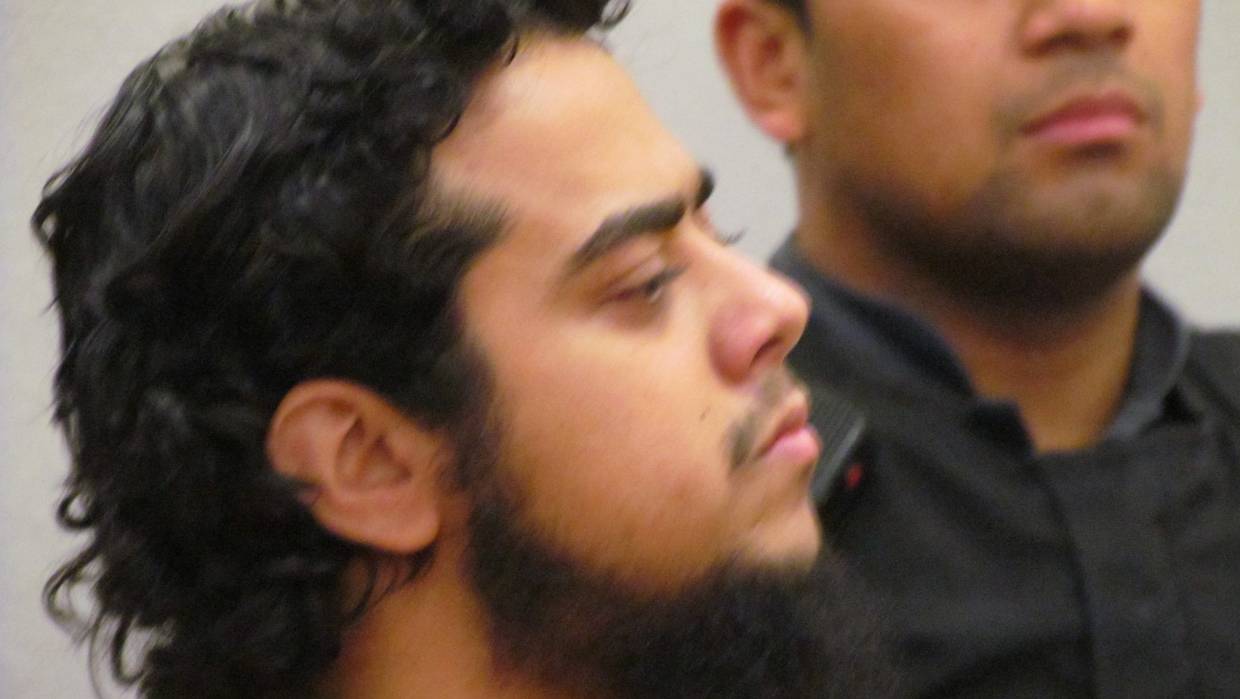
An Auckland man has become the first person in the country to be jailed for possessing and circulating objectionable material related to extreme violence.
Imran Patel, 26, has been jailed for three years and nine months after pleading guilty to making, distributing and possessing videos depicting cruel violence perpetuated by terrorist group Isis.
As he was sentenced Patel stood up and screamed, “Tell John Key to stop being a slave to America!” He had to be pulled from the courtroom by security guards. He continued screaming as he was escorted to custody cells.

According to a summary of facts Patel was known to police to be an Isis sympathiser. He was one of two men with Isis sympathies sentenced in Auckland on Thursday.
His ISP network provider cautioned him about the content he was sending but he sent a second message to the same people, with a similar video showing prisoners being beheaded. An Isis logo was visible.
This prompted the network to bar his number from sending further messages.
He obtained another number and sent a further text to the same recipients chastising them for getting his number disabled.
“Remember that you are a Muslim so behave like one,” he texted them.
Two months later, in December, Patel’s home was searched and police discovered a laptop containing 62 objectionable videos showing extreme violence or cruelty.
The videos, as well as copies of an Isis endorsed magazine with propaganda, had been copied to various devices.
A DVD disc contained 17 objectionable files, three USB devices had 67 objectionable files, and an iPod had 19 objectionable files.
He had shared some of the files with a friend by putting them onto a USB stick.
By way of explanation Patel told police he wanted to provide information on what was happening in the Middle East, because he believed western media wasn’t showing a balanced view.
He said the people shown to have been executed in the videos were “murderers and rapists”.
“(Patel) wanted to show a true picture of what Isis does in fighting the Syrian regime and helping people,” the summary said.
At the Auckland District Court on Thursday Judge Russell Collins said counsel had struggled to find any case law on the matter, with all objectionable material charges in New Zealand to date relating to indecent child images.
He said he wasn’t sentencing Patel based on any religious or political beliefs he may have or any likelihood that he would carry out extreme violence.
Crown prosecutor David Johnstone argued Patel showed no remorse for his offending and rejected Patel’s complaint that he was being held in solitary confinement. He said Patel had been remanded into a voluntary protective custody.
He was allowed to exercise for two hours a day and leave to bathe, Johnstone said. “It’s not solitary confinement. There is no such thing as solitary confinement in New Zealand.”
Defence lawyer Adam Holland said Patel’s culpability was low and there was a degree of “quite painful naivety” because Patel didn’t realise possession of the material was illegal: “He admits he made a grave error.”
He said the distribution charge amounted to him sharing the videos with known associates and the charge related to making the material was nowhere near as serious as cases of people who filmed children being abused. Patel had simply compiled videos, he said.
Holland said the “reality” was that Patel was being held in solitary confinement and he believed it was because of the nature of the charges. He asked Judge Collins to take that into consideration in sentencing. Patel had initially consented to being held in segregation but had no understanding that meant he would be locked up for 22 hours a day, Holland said.
While the Crown was arguing for a starting point of five years in prison, Holland was asking for two to three years imprisonment and considering his incarceration for the last six months that made home detention a “realistic” option, he said.
A defendant can become eligible for home detention if they’re sentenced to two years or less in prison.
Judge Collins said although the violence depicted in the videos was on the other side of the world, he said the celebration of “grotesque” violence in the videos was of concern.
He declined to impose a minimum period of imprisonment.
Patel’s parents were in court for the sentencing.
Shortly afterward Judge Collins also sentenced Niroshan Nawarajan, 27, for a similar charge of possession of objectionable material.
He had also pleaded guilty to aggravated assault, resisting arrest, being found in an enclosed yard, failing to answer bail and possession of offensive weapons.
The charges related to three separate incidents in Christchurch and Auckland.
While on bail in January he had entered the US Consulate building in central Auckland wearing an Isis t-shirt and asked if the building was bomb proof.
The building went into lock down and he resisted the arrest, using “racist terms” and kicked out and attempted to punch the officers.
He told the officers: “Isis is here.”
At the police station he was found with a hard drive which contained numerous videos showing people being executed or having their limbs cut off.
Months before that he was caught on an industrial site in Christchurch without permission, claiming he was looking for his cat. Later he was caught with two knives and a hatchet.
Nawarajan was remanded in custody in January where he had remained since, prompting Judge Collins to consider home detention for the remainder of his sentence.
He discharged Nawarajan for the charge of failing to answer bail but on the other charges sentenced him to five months home detention.
Men sentenced for Islamic State propaganda

